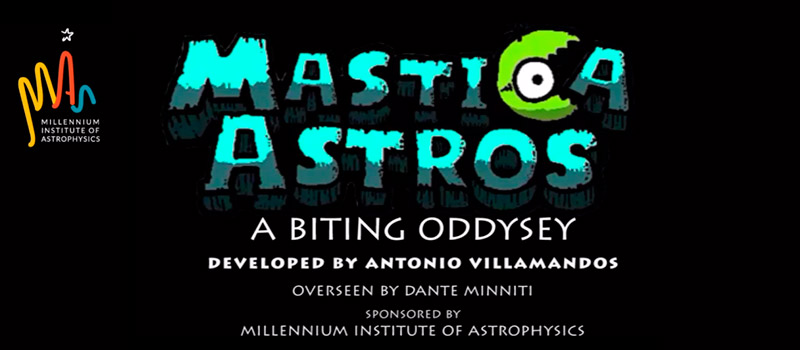[:en]“There are 100.000.000.000 millions of stars in our Galaxy and there are 100.000.000.000 galaxies in the Universe. That means there are more stars out there in the Universe than sand grains in all of the beaches of the world. How many planets potentially habitable orbit around the Universe? That is what we are currently studying and we also need to discover”
With this astonishing number Dante Minniti, Deputy Director of MAS and researcher at Universidad Andrés Bello and CATA, ended his talk “Searching Life in the Universe,” at the Astronomy Festival at the Academy, organized by MAS, the Center for Excellence in Astrophysics and Associated Technologies (CATA, by its acronyms in Spanish), and the Sciences Academy.
In this opportunity, Minniti invited the +100 impressed assistants to a journey through the Cosmos, our Solar System and the new exoplanets found in the last years, explaining the conditions required for a planet to be habitable.
“The elements to create life are present all over the Universe, even in the Solar System. What we need, in the first place, is a planet similar in size and mass to Earth, where the superficial water could remain in its liquid state. However, we know there are other systems like ours and we are finding other worlds very similar to Earth, we still don`t know if there is life outside our planet. Science has advanced but there are more unsuspected discoveries to come,” Dante states.
In this sense, he highlighted the large instruments installed in our country, where more objects can be discovered.
[:es]“Hay 100.000.000.000 millones de estrellas en nuestra galaxia y hay 100.000.000.000 de galaxias en el Universo. Eso significa que hay más estrellas en el Universo que todos los granitos de arena de todas las playas de la Tierra. ¿Cuántos planetas con potencial para la vida las orbitan? Eso es lo que estamos y necesitamos seguir descubriendo”. Con esta impresionante cifra Dante Minniti, subdirector del Instituto Milenio de Astrofísica MAS, investigador de la Universidad Andrés Bello y del Centro de Astrofísica y Tecnologías Afines CATA cerró su charla “Búsqueda de Vida en el Universo” que dejó impresionados a los más de 100 asistentes presentes. Todo el marco de la penúltima charla del Festival de Astronomía en la Academia, organizado por MAS, el CATA y la Academia de Ciencias.
En la oportunidad el investigador invitó al público a un paseo por el cosmos, un recorrido por nuestro sistema solar y los nuevos exoplanetas encontrados en los últimos años, aclarando qué condiciones deben tener para albergar potencialmente vida.
“Los ingredientes para la vida están en todo el Universo, incluso en el sistema solar. Lo que necesitamos en primera instancia es que un planeta sea del tamaño y masa similar a la Tierra, donde el agua superficial pueda permanecer en estado líquido. Sin embargo, aunque sabemos que hay otros sistemas como el nuestro y estamos encontrando otros mundos similares, todavía no sabemos si hay vida fuera de la Tierra. Hay grande avances y los próximos años prometen descubrimientos insospechados”, comenta Dante.
En este sentido, destacó la instalación de grandes instrumentos en nuestros país, desde donde, señala, se podrían realizar estos grandes hallazgos.
[:]








